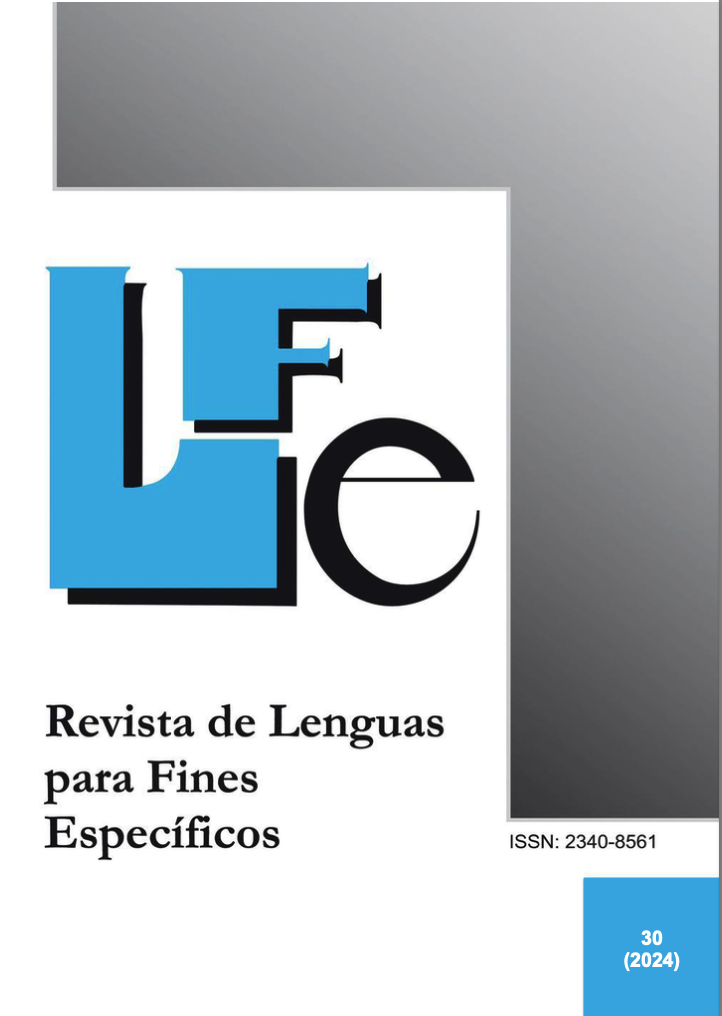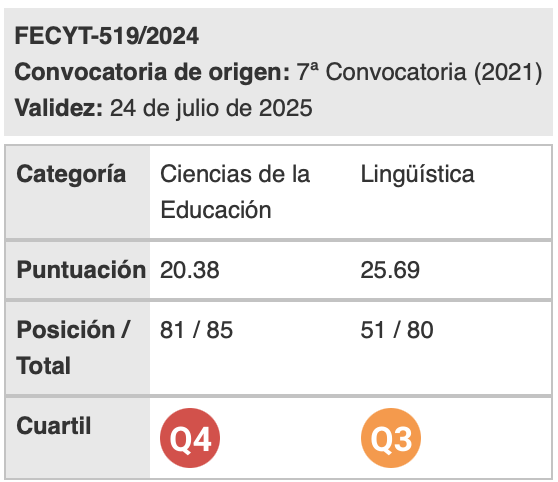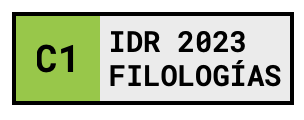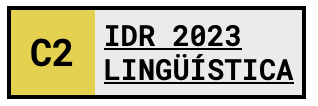Deontic modality in tourism scientific writing
DOI:
https://doi.org/10.20420/rlfe/2024.700Keywords:
modality, deontic modality, tourism, research article, genreAbstract
This article focuses on deontic modal verbs found in a corpus of tourism research papers. The originality of this study lies mainly in the selection of two fundamental sections of the research article for its reception and impact as a scientific contribution, namely the introduction and the conclusion. As already expressed in Álvarez-Gil and Domínguez-Morales (2018) and Álvarez-Gil (in press), the research article in tourism is by far one of the least explored. The methodology involves the use of corpus linguistics tools. Since context is central to the identification of modal meanings, part of the analysis of the texts also requires manual analyses. The findings of this study suggest that there is certainly variation not only in terms of the forms used in each of the introductions and conclusions, but also in terms of senses identified. Deontic modality in the corpus analysed is attested to express prediction, organisation of the contents in the article, as well as to express authority. Another evident meaning of the deontic modals is to indicate advice which is beneficial for the tourist industry.
Downloads
References
Alonso-Almeida, Francisco. (2014). Evidential and epistemic devices in English and Spanish medical, computing and legal scientific abstracts: A contrastive study. Linguistic Insights, vol. 187, 21–42. Bern, Berlin, New York: Peter Lang.
Alonso-Almeida, Francisco. (2015a). On the mitigating function of modality and evidentiality. Evidence from English and Spanish medical research papers. Intercultural Pragmatics, vol. 12(1). 33–57. https://doi.org/10.1515/ip-2015-0002
Alonso-Almeida, Francisco. (2015b). Introduction to stance language. Research in Corpus Linguistics (3). 1–5.
Alonso-Almeida, Francisco. (2015c). The functions of seem and parecer in early medical writing. Discourse Studies, 17(2). 121–140. https://doi:10.1177/1461445614564517
Alonso-Almeida, Francisco. (2015d). Sentential epistemic and evidential devices in Spanish and English texts on computing. In Juan Rafael Zamorano-Mansilla, Carmen Maíz, Elena Domínguez & Ma Victoria Martín de la Rosa (eds.), Thinking Modally: English and Contrastive Studies on Modality, 383–408. Newcastle upon Tyne: Cambridge Scholars Publishing.
Alonso-Almeida, Francisco & Francisco J. Álvarez-Gil (2019). Modal verb categories in CHET. Writing History in Late Modern English: Explorations of the Coruña Corpus. 150-165. Amsterdam: John Benjamins Publishing Company. https://doi.org/10.1075/z.225.08alo
Alonso-Almeida, Francisco & Francisco J. Álvarez-Gil. (2020). ‘so that it may reach to the jugular’. Modal Verbs in Early Modern English Recipes. Studia Neofilologiczne, vol. XVI. 61–88. http://dx.doi.org/10.16926/sn.2020.16.04
Alonso-Almeida, Francisco. (2021). Los modales dinámicos en textos de historia en lengua inglesa (1700-1900). Revista Signos. Estudios de Lingüística, vol. 54(106). 529–548
Alonso-Almeida, Francisco & Francisco J. Álvarez-Gil. (2021). Developing Argumentation in History Texts: Epistemic Modality and Evidentiality. Pragmalingüística, 29.
Alonso-Almeida, Francisco & María Luisa Carrió-Pastor. (2017). Variation and Function of Modals in Linguistics and Engineering Research Papers in English. In Juana I Marín-Arrese, Julia Lavid-López, Marta Carretero, Elena Domínguez Martín de la Romero, Ma Victoria Rosa & María Pérez Blanco (eds.), Evidentiality and Modality in European Languages. Discourse- pragmatic perspectives, 277–311. Bern, Berlin, Bruxelles, Frankfurt am Main, New York, Oxford, Wien: Peter Lang.
Álvarez-Gil, Francisco J. (2018). Epistemic modals in early Modern English history texts. Analysis of gender variation. Revista de Lingüística y Lenguas Aplicadas, vol. 13(1), 13-20. https://doi.org/10.4995/rlyla.2018.7801
Álvarez-Gil, F. J. (forthcoming). Stance devices in tourism-related articles. A corpus-based study. Peter Lang
Álvarez-Gil, Francisco J. & Elena Domínguez-Morales. (2018). Modal verbs in the abstract genre in the field of tourism. Revista de lenguas para fines específicos, vol. 24(2). 27–37. http://doi:10.20420/rlfe.2018.232
Álvarez-Gil, Francisco J. & María Elena Domínguez-Morales. (2021). Modal verbs in academic papers in the field of tourism. Revista Signos. Estudios de Lingüística, vol. 54(106). 549–574.
Auwera, Johan Van der & Vladimir A. Plungian. (1998). Modality’s semantic map. Linguistic Typology, vol. 2(1). 79–124. http://doi:10.1515/lity.1998.2.1.79
Biber, Douglas, Stig Johansson, Geoffrey Leech, Susan Conrad & Edward Finegan. (1999). Longman Grammar of Spoken and Written English. London: Longman.
Boye, Kasper & Peter Harder. (2009). Evidentiality: Linguistic categories and grammaticalization. Functions of Language, vol. 16(1). 9–43. http://doi:10.1075/fol.16.1.03boy
Carrió-Pastor, María Luisa. (2017). Mitigation of claims in medical research papers: A comparative study of English- and Spanish-language writers. Communication & Medicine, vol. 13(3). 249–261. http://doi:10.1558/cam.28424. https://www.equinoxpub.com/journals/index.php/CAM/article/view/28424
Carrió-Pastor, María Luisa. (2019). Cross-cultural analysis of English modal constructions in engineering academic papers. Odisea: Revista de estudios ingleses, vol. (20), 75-90.
Chafe, Wallace. (1986). Evidentiality in English conversation and academic writing. In W. Chafe & J Nichols (eds.), Evidentiality: The linguistic coding of epistemology, 261–272. Norwood, NJ: Ablex.
Chafe, Wallace & Nichols, Johanna. (1986) (eds.), Evidentiality: The linguistic coding of epistemology. Norwood, NJ: Ablex.
Charlow, Nate & Matthew Chrisman. (2016). Deontic Modality. Oxford: Oxford University Press.
Cheng, Winnie & Le Cheng. (2014). Epistemic modality in court judgments: A corpus-driven comparison of civil cases in Hong Kong and Scotland. English for Specific Purposes 33. 15–26. http://doi:10.1016/j.esp.2013.07.006
Collins, Peter. (2009). Modals and Quasi-modals in English. Amsterdam, New York: Rodopi.
Efstathiadi, Lia. (2010). The use of epistemic markers as a means of hedging and boosting in the discourse of L1 and L2 speakers of Modern Greek: A corpus-based study in informal letter-writing. Themes in Science and Technology Education: Special issue on ICT in Language Learning. Computer-aided language analysis, teaching and learning: Αpproaches, perspectives and applications, vol. 3(1–2). 181–206. https://files.eric.ed.gov/fulltext/EJ1131486.pdf
Giltrow, Janet. (2005). Modern Conscience: Modalities of Obligation in Research Genres. Text - Interdisciplinary Journal for the Study of Discourse, vol. 25(2). 171–199. http://doi:10.1515/text.2005.25.2.171
Gotti, Maurizio & Marina Dossena. (2001). Introduction. In Maurizio Gotti (ed.), Modality in Specialized Texts: Selected Papers of the 1st CERLIS Conference, 9–18. Bern, Berlin, New York: Peter Lang.
Greco, Paolo. (2018). Evidentiality and epistemic modality in witness testimony in the context of Italian criminal trials. Journal of Pragmatics. Elsevier Ltd 128. 128–136. https://doi.org/10.1016/j.pragma.2017.10.005
Haßler, Gerda. (2011). Epistemic modality and evidentiality and their definition on a deictic basis. In Martin G. Becker & Eva-Maria Remberger (eds.), Modality and Mood in Romance. Berlin / New York: Walter de Gruyter & Co. http://doi:10.1515/9783110234343.1.95
Hoye, Louis. (1997). Adverbs and modality in English. London: Longman.
Lazard, Gilbert. (2001). On the grammaticalization of evidentiality. Journal of Pragmatics. http://doi:10.1016/S0378-2166(00)00008-4
Leavitt, John, Wallace Chafe & Johanna Nichols. (1991). Review of Evidentiality: The Linguistic Coding of Epistemology. Language, vol. 67(1). 133. http://doi:10.2307/415546
Lyons, John. (1977). Semantics. Cambridge: Cambridge University Press.
Mauranen, Anna. (2018). Second Language Acquisition, world Englishes, and English as a Lingua Franca (ELF). World Englishes, vol. 37(1). 106–119. http://doi:10.1111/weng.12306
Mushin, Ilana. (2013). Making knowledge visible in discourse: Implications for the study of linguistic evidentiality. Discourse Studies, vol. 15(5). 627-645. http://doi:10.1177/1461445613501447
Narrog, Heiko. (2005). On defining modality again. Language Sciences, vol. 27(2). 165–192. http://doi:10.1016/j.langsci.2003.11.007
Narrog, Heiko. (2012). Modality, Subjectivity, and Semantic Change. Oxford: Oxford University Press. http://doi:10.1093/acprof:oso/9780199694372.001.0001
Nuyts, Jan. (2001). Epistemic modality, language, and conceptualization: A cognitive-pragmatic perspective. Amsterdam, New York: John Benjamins Publishing Company.
Palmer, Frank R. (1986). Mood and modality. Cambridge: Cambridge University Press.
Palmer, Frank R. (1990). Modality and the English Modals. 2nd edn. New York: Longman.
Palmer, Frank R. (2001). Mood and Modality. Cambridge: Cambridge University Press.
Plungian, Vladimir A. (2001). The place of evidentiality within the universal grammatical space. Journal of Pragmatics. http://doi:10.1016/S0378-2166(00)00006-0
Rocci, Andrea. (2017). Modality in Argumentation (Argumentation Library). Vol. 29. Dordrecht: Springer Netherlands. http://doi:10.1007/978-94-024-1063-1
Römer, Ute. (2009). English in Academia: Does Nativeness Matter? Anglistik: International Journal of English Studies, vol. 20(2). 89-100
Saeed, John I. (2016). Semantics. 4th edn. Chichester: Wiley Blackwell.
Tribble, Christopher. (2017). ELFA vs. Genre: A new paradigm war in EAP writing instruction? Journal of English for Academic Purposes, vol. 25. 30–44. http://doi:10.1016/j.jeap.2016.10.003
Viechnicki, Gail Brendel. (2002). Evidentiality in scientific discourse. Department of Linguistics. Chicago: University of Chicago
Published
How to Cite
Issue
Section
License
Copyright (c) 2024 Elena Domínguez Morales, Isabel Soto Déniz

This work is licensed under a Creative Commons Attribution-NonCommercial-NoDerivatives 4.0 International License.
Authors who publish with this journal agree to the following terms:
- Authors retain copyright and grant the journal right of first publication with the work simultaneously licensed under a Creative Commons Attribution License that allows others to share the work with an acknowledgement of the work's authorship and initial publication in this journal.
- Authors are able to enter into separate, additional contractual arrangements for the non-exclusive distribution of the journal's published version of the work (e.g., post it to an institutional repository or publish it in a book), with an acknowledgement of its initial publication in this journal.
- Authors are permitted and encouraged to post their work online (e.g., in institutional repositories or on their website) prior to and during the submission process, as it can lead to productive exchanges, as well as earlier and greater citation of published work (See The Effect of Open Access).

Revista de Lenguas para fines específicos is licensed under a Creative Commons Reconocimiento-NoComercial-SinObraDerivada 4.0 Internacional License.

























